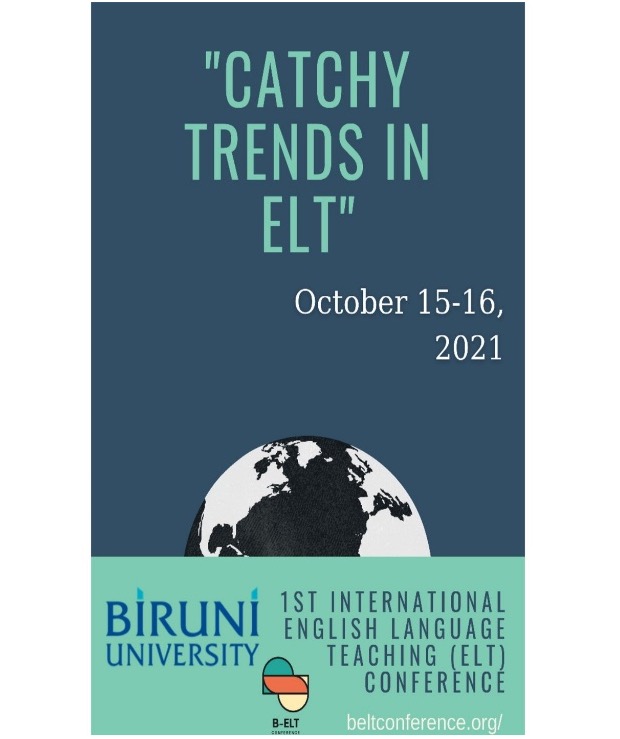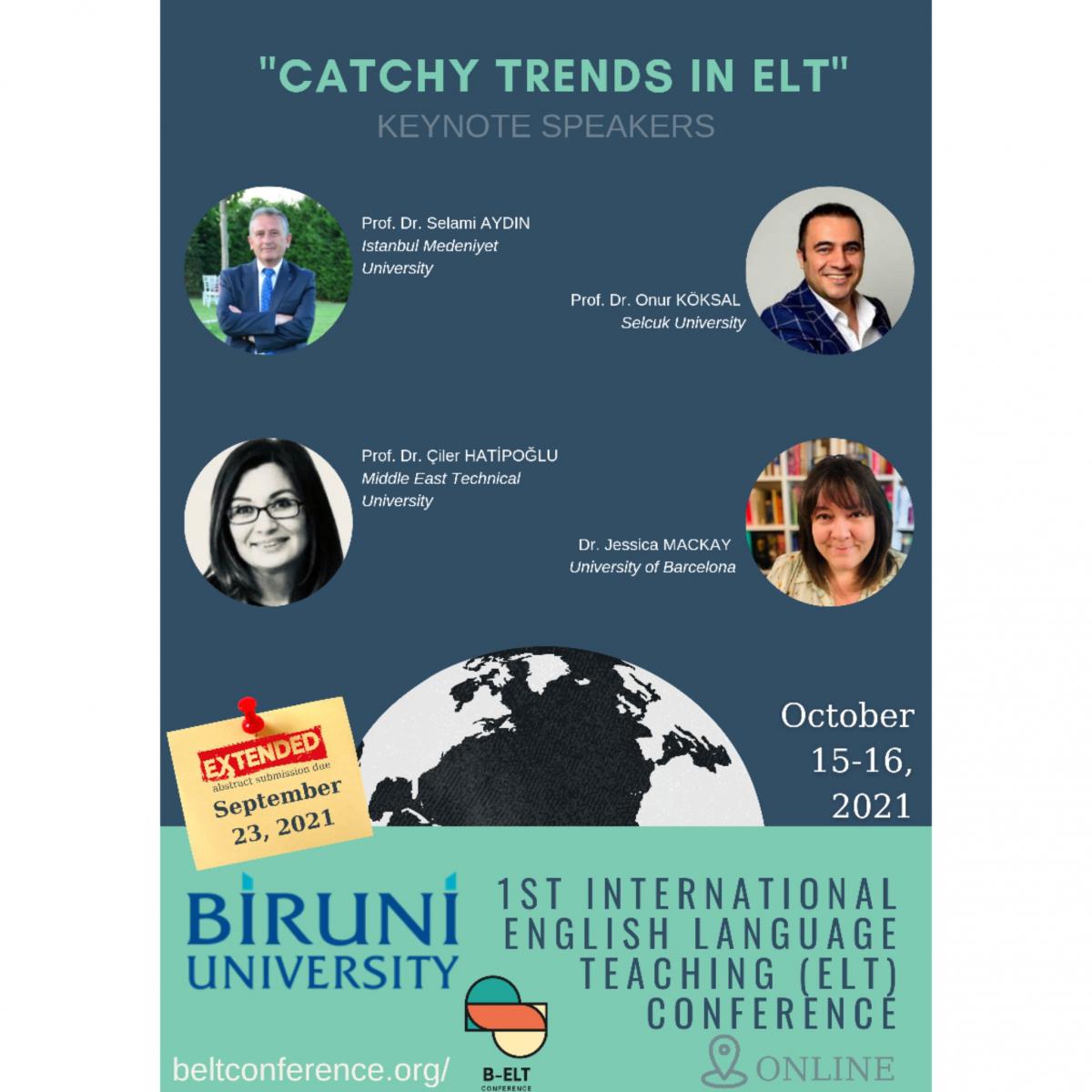REFLECTIONS FROM THE 1ST INTERNATIONAL ENGLISH LANGUAGE TEACHING CONFERENCE
REFLECTIONS FROM THE 1ST INTERNATIONAL ENGLISH LANGUAGE TEACHING CONFERENCE:
“Catchy Trends in ELT”
by
Gülden ÇELİK
 The first International English Language Teaching Conference to be organized by Biruni University comprised a two-day online event. There were four plenary speakers and more than thirty speakers each of whom shared their valuable experiences on today’s catchy trends in ELT, which was also the theme of the conference. Some of the most popular catchy trends among the presentations were the use of Edmodo and WhatsApp in Language Classes, the layered curriculum instructional model, changes in education caused by online teaching and learning processes, the essential need to help educators acquire 21st century skills such as technology literacy and, following on from this, the need to implement some of these 21st century skills in our language classes, which was presented by me with an apt reference to our PROJ OO1 course.
The first International English Language Teaching Conference to be organized by Biruni University comprised a two-day online event. There were four plenary speakers and more than thirty speakers each of whom shared their valuable experiences on today’s catchy trends in ELT, which was also the theme of the conference. Some of the most popular catchy trends among the presentations were the use of Edmodo and WhatsApp in Language Classes, the layered curriculum instructional model, changes in education caused by online teaching and learning processes, the essential need to help educators acquire 21st century skills such as technology literacy and, following on from this, the need to implement some of these 21st century skills in our language classes, which was presented by me with an apt reference to our PROJ OO1 course.
On the first day, there were three plenary speakers giving speeches on three different aspects of English Language Teaching. The first, Prof. Dr. Selami Aydın, who is a faculty member at Istanbul Medeniyet University at the Faculty of Educational Sciences, introduced Edmodo as a social media platform in the language learning process. Despite its unclear outcomes in revealing how it affects the learning process, Prof. Aydın presented the results of the Edmodo uses in classes and shared the positive feedback from the learners and teachers. Besides, he placed emphasis on the fact that the use of Edmodo in language classes also facilitates 4Cs (critical thinking, creativity, communication, and collaboration) as well as other basic language skills. The second plenary speaker, Prof. Dr. Onur Köksal, who is a faculty member at Selçuk University, gave his presentation on the layered curriculum instructional model in English Language Teaching. As a new instructional model, Prof. Köksal stated that it aims to change the student role from the receiver of information to the producer of information. Additionally, he shared that such a model prioritizes the activities and tasks in line with each student’s interests, abilities, and learning types, which in turn offers major benefits to students.
Before the third plenary speaker’s presentation, I shared my own presentation which was about “Why and How to Boost 21st Century Skills in EFL classes”. Believing that 21st century skills have also turned into catchy trends in ELT, the whole presentation aimed to question their possible integration into our language classes. In light of the research collated and analysed, 21st century skills have intentionally been implemented in language classes by a task based approach (such as through a range of activity types, pair and group work, or peer review) or through project based learning (PBL). In theory, each has been clearly defined, but few resources explain how it can actually work in a real class environment. Halvorsen’s (2019) article “21st Century Skills and the ‘4Cs’ in the English Language Classroom” is an exception. Inspired by his short article, some of the most reverberating 21st century skills’ (especially the 4C’s) possible integration via PBL into our SL context was analysed, and to that end PROJ 001 was introduced. The reasons for its introduction into our Route 4 programme, its stages and how each stage fosters specific 4Cs (as well as some other 21st century skills such as technology literacy, soft skills etc.), its outcomes and assessment were described. The whole presentation, with a focus on PROJ 001, received very positive feedback from the participants as well as the Head of the Faculty of Education at Biruni University, Asst. Prof. Dr. Görsev Sönmez. The whole event was neatly organized such that the subsequent session was on 21st century skills specifically from the teacher’s perspective by Asst. Prof. Dr. Görsev Sönmez. She explicitly explained why teachers need to equip themselves with 21st century skills as a part of their continuous professional and personal development, bringing attainment of technological literacy sharply into focus.
 The third plenary speaker was Prof. Dr. Çiler Hatipoğlu, who is a Professor at the Department of Foreign Language Education, Middle East Technical University. Her comprehensive presentation was based on the essential change in language assessment or at any rate on the idea of “expanding the assessment literacy of language teachers” (Berry, Sheehan, & Munro, 2019; Jeong, 2013, Vogt & Tsagari, 2014). To that end, she shared one of her undergraduate English Language Testing and Evaluation (ELTE) courses and its detailed analysis based on two different sets of data collected between 2017 and 2020 through questionnaires and student-created outputs such as exams or/and self-assessment presentations. As a result of her research, she found out that pre-service language teachers taking the ELTE course and their language assessment literacy (LAL) were positively influenced. The whole presentation attracted all presenters’ attention from the beginning till the end.
The third plenary speaker was Prof. Dr. Çiler Hatipoğlu, who is a Professor at the Department of Foreign Language Education, Middle East Technical University. Her comprehensive presentation was based on the essential change in language assessment or at any rate on the idea of “expanding the assessment literacy of language teachers” (Berry, Sheehan, & Munro, 2019; Jeong, 2013, Vogt & Tsagari, 2014). To that end, she shared one of her undergraduate English Language Testing and Evaluation (ELTE) courses and its detailed analysis based on two different sets of data collected between 2017 and 2020 through questionnaires and student-created outputs such as exams or/and self-assessment presentations. As a result of her research, she found out that pre-service language teachers taking the ELTE course and their language assessment literacy (LAL) were positively influenced. The whole presentation attracted all presenters’ attention from the beginning till the end.
On the second day, the fourth plenary speaker Dr. Jessica Mackay, who is an EFL teacher and the head of Teacher Training Unit at the School of Modern Languages, Universitat de Barcelona gave a very interesting and interactive presentation on the ongoing research project implemented in an adult EFL context in Barcelona. Dr. Mackay initially informed us about the concept of mobile language learning and then introduced the target group of learners who have been voluntarily involved in a research project using WhatsApp as the primary lesson material/tool. By stressing the significance of interaction patterns online, Dr. Mackay shared how learners have responded to the prompts given and what kind of language they have produced. She stated that the research has also enabled her and her team to evaluate which task types work better on WhatsApp to promote learners’ participation, motivation, and learning. In the end, although the research was still in progress, Dr. Mackay presented some findings, including how such a learning process can be learner-generated and therefore avoid reluctance to speak and L1 use. It received very positive feedback.
In addition to the plenary speakers, there were so many distinguished teachers, researchers, and teacher researchers who made their presentations on various catchy trends in ELT, including but not limited to the challenges of teaching writing, its assessment and feedback in face to face and online instruction, the use of songs to promote learner agency in English language classes, flipped learning in grammar instruction, and the effects of collaborative learning on learner autonomy. The whole event ended with the closing remarks by the Organizing Committee announcing the good news that the B-ELT Conference will be held next year also, and this one will hopefully be face to face on their campus.
REFERENCES
Halvorsen, A. (2018). 21st Century Skills and the “4Cs’” in the English Language Classroom, University of Oregon.
Plucker, J., Kaufman, J. & Beghetto, R. (2016). The 4Cs research series. P21: Partnership for 21st Century Learning. Retrieved from htpp://www.p21.org/our-work/4cs-research-series.
Berry, V., Sheehan, S., & Munro, S. (2019, April). What does language assessment literacy mean to teachers? ELT Journal, 73(2), 113-123. doi:10.1093/elt/ccy055.
Jeong, H. (2013). Defining assessment literacy: Is it different for language testers and non-language testers? Language Testing, 30(3), 345-362. https://doi.org/10.1177/0265532213480334.
Vogt, K., & Tsagari, D. (2014). Assessment literacy of foreign language teachers: Findings of a European study. Language Assessment Quarterly, 11(4), 374-392.
